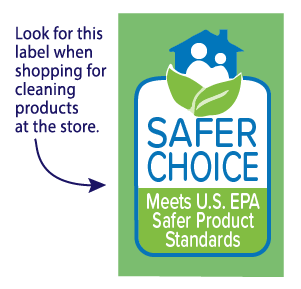While the rare individual may delight in cleaning his or her home, most of us regard it as a definite chore. But regardless of where you fall on the loving/hating-to-clean spectrum, when you do clean—clean green! By using products that don't contain ingredients that are harmful to you or the environment, the cleaning may be a headache, but the products won't give you an actual headache…
Why Clean Green?
Even if you don't consider yourself an environmentalist, there are plenty of reasons to clean in an eco-friendly way:
It's better for you. Traditional cleaners contain chemicals that are associated with a range of long- and short-term health problems, including headaches, dizziness, difficulty breathing, and cancer. For more on how chemical pollutants commonly found in cleaning products are 2-to-5 times higher in homes than in outdoor air, see Indoor Air Quality on the Massachusetts Environmental Public Health Tracking website. And if you are curious about the contents of your cleaning products, Consumer Reports' Safer Cleaning Supplies page has the dirt on common cleaning chemicals.
DID YOU KNOW? - Naptha, an ingredient in furniture and floor polishes and found in some glass cleaners, can cause headaches, nausea, and central-nervous-system symptoms with overexposure.
It's cheaper. Though a Consumer Reports survey found that 44% of people surveyed would be willing to spend more money on safer cleaning products, often these products are equal in price or less expensive than traditional cleaners anyway. Homeowners can also choose to use inexpensive non-toxic household ingredients, such as vinegar and baking soda, to complete their cleaning tasks - see 6 DIY Non-Toxic Cleaning Recipes from Small Footprint Family for more frugal, do-it-yourself cleaning solutions.
DID YOU KNOW? - You can unclog a drain using vinegar, baking soda, and hot water? (See the Martha Stewart page for details.) Much cheaper—and much, much better for you and the environment than commercial drain cleaners containing sulfuric acid and lye.
We've only got one planet. A fairly easy way to be kind to Earth—our one and only home planet—is to only use cleaning products you could ingest without having to call 911. See How to Clean Your House without Hurting the Planet from Grist Magazine for more green cleaning information from the planet-protecting perspective.
If you are convinced (or even just curious), give green-cleaning a try. From rust stains to clogged drains to scratched wood, there are environmentally friendly solutions for just about everything.
Earth-and-Ocean-Friendly Cleaners You Can Make
See the sites below to find the green-clean solutions that will work best for you:
- The Massachusetts Office of Coastal Zone Management's (CZM's) A Greener Cleaner article on page 11 of the 2008 Coastlines (PDF, 9 MB) includes recipes to clean everything from dull floors to dirty drains to toilet bowls.
- The Children's Hospital of Philadelphia's 10 Non-toxic, DIY Cleaning Products recommends practices to protect children from toxins.
- Eartheasy's Non-Toxic Home Cleaning has easy-to-use alternative cleaners and formulas for making your own cleaning products.
- Coming Home details 11+ Uses for Vinegar You Need to Know About, including how to remove stains, sanitize containers, and deodorize air..
- The DIY Network's How to Make Natural Cleansers from Pantry Items, covers cleaning with vinegar, baking soda, rubbing alcohol, and other products you probably already have in your pantry.
DID YOU KNOW? Phosphates (commonly found in dishwashing and laundry detergents) can get into rivers, streams, and the ocean where they can cause the overgrowth of algae and aquatic weeds, which can kill off fish populations and other aquatic life? And when Nonylphenol ethoxylates (NPEs) (found in a wide range of cleaning products, detergents, and disinfectants) are released into the environment, the chemicals can break down in such a way that they threaten the reproductive capacity of fish, birds, and mammals.
Kinder, Gentler Commercial Cleaners
If you don't have the time or inclination to make your own cleaning products, safer cleaners are commercially available. To help determine which ones are best for your health and the environment, see:
- EPA's Safer Choice website provides information on more than 2,000 products that have the Safer Choice label, indicating good performance and greater safety for human health and the environment.
- Green Seal's Certified Products & Services includes the products that they have certified as meeting "rigorous, science-based environmental leadership standards."
Coast-Friendly Boat Cleaning
Because boat cleaning is often done on or near coastal waters, environmentally harmful cleaning products can mean big water quality problems. Luckily, you can also clean your boat, inside and out, with natural ingredients. For specifics, see:
- The California Division of Boating and Waterway's Simple Household Alternatives to Boat Cleaning and Maintenance Products.
- CZM's Massachusetts Clean Marina Guide, particularly the Boater Fact Sheets, and the CZ-Tip - Simple Steps to Clean Boating in Massachusetts.
- The Connecticut Department of Environmental Protection's Action Guide for Boaters (PDF, 1 MB).
